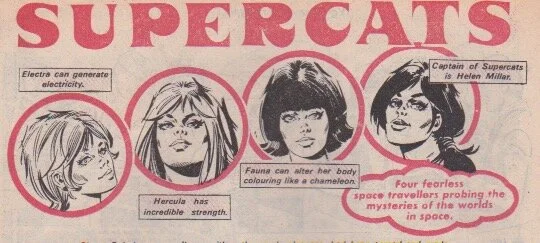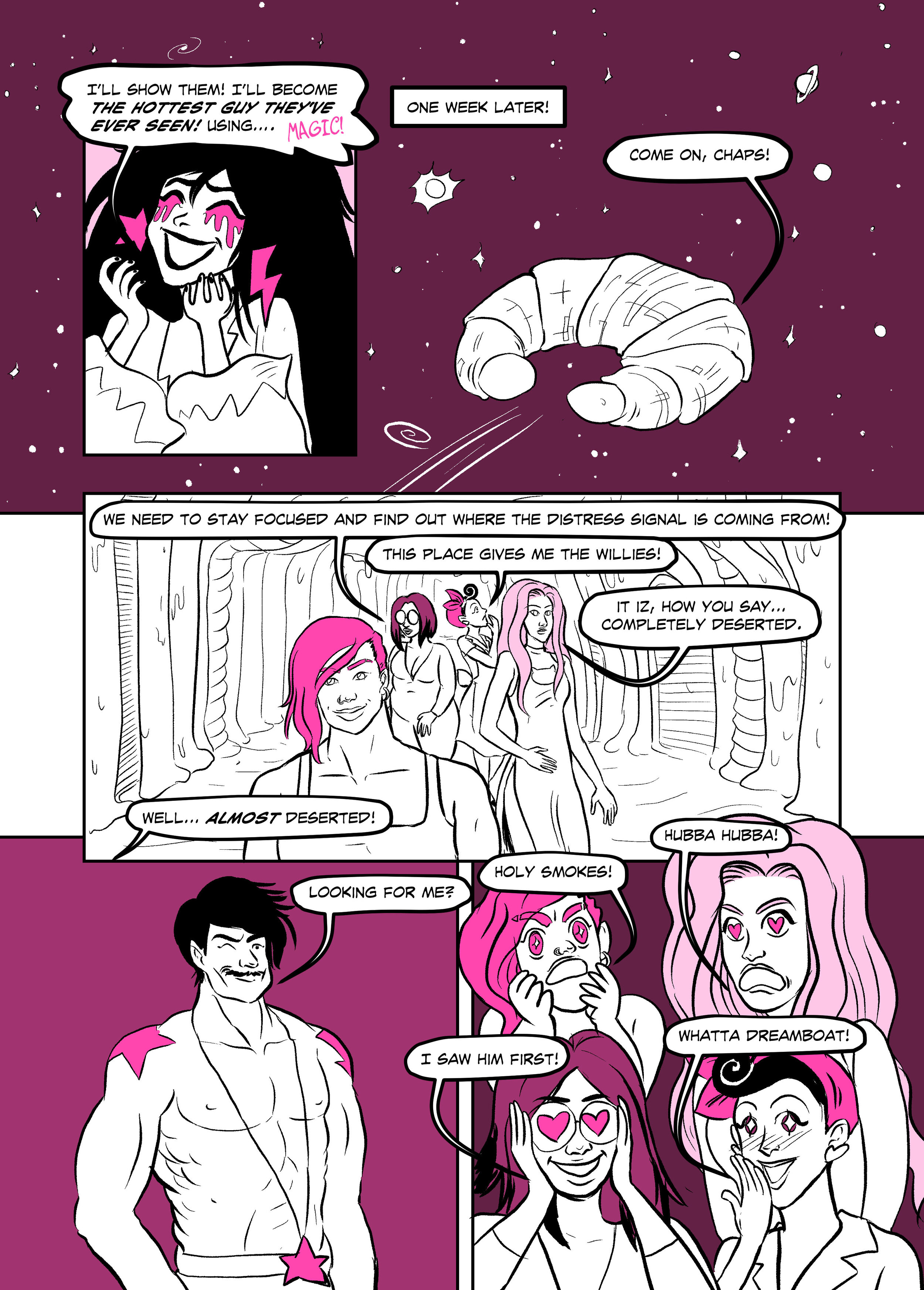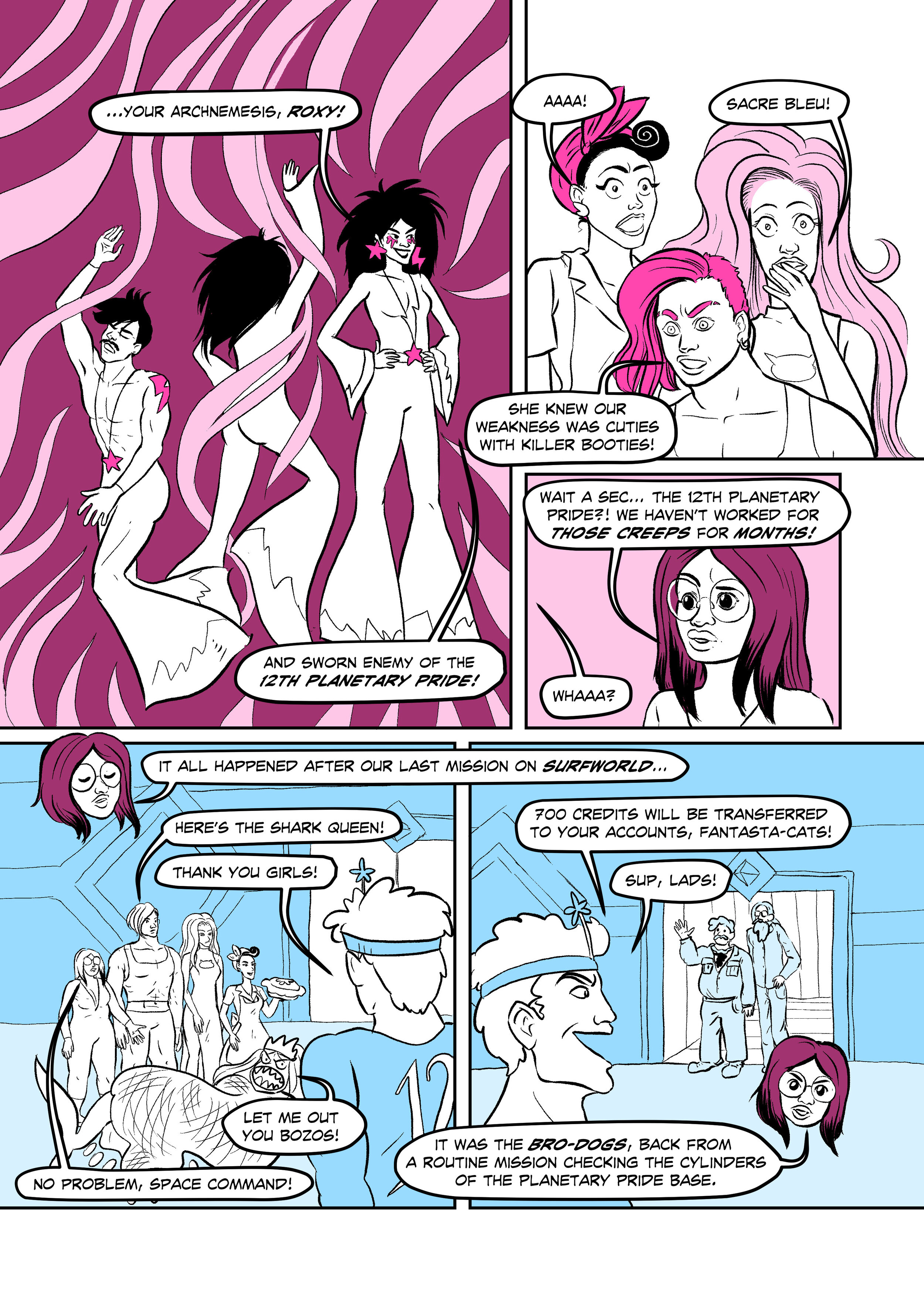'Supercats & Fantasta-Cats,' by Olivia Hicks & Zu Dominiak
/Olivia Hicks
In the distant future, the galaxy is protected by… the Supercats! The stars of Moonbase 4, the Supercats are troubleshooting super-teens, and comprise of: Hercula, who has super strength; Electra, who has electric powers; Fauna, who can change her body colour like a chameleon; and Helen, has no powers, and is the captain.
This delightfully mad comic appeared across a number of Scottish publisher D.C. Thomson’s girls’ comics titles in the 1970s, beginning in Diana as the Fabulous Four in 1974. The initial title calls to mind both the Beatles and the Fantastic Four and sets up a range of playful transatlantic influences. The team were then renamed the Supercats and became the cover stars of mystery comic Spellbound in 1976. Spellbound lasted till 1978, when it merged with Debbie (this was a common practice with failing titles). The Supercats survived the merger with Debbie, but not for very long – their last appearance was in April 1978.
The comic was part science fiction adventure, part romance, and represents the more whimsical end of British girls’ comics. Magic and science fiction were melded together in a carefree fashion and the stories are accompanied by glorious (if unnecessarily sexy) art by Jorge B. Galvez and Enrique Bardía Romero.
The comic presented the four friends as glamorous career teens with a bevvy of boyfriends, tapping into the portrayal of single working women in contemporary magazines such as Cosmopolitan Magazine. The comic also flirted with second wave feminism: in the two parter ‘No Place for Trespassers!’ (Spellbound #28 and 29; 1977), the Supercats do battle with the galactic chauvinist Skorn who wishes to enslave all women. The story isn’t subtle; at one point the Supercats inform the men that ‘Sorry chums, you’re not OUR masters!’, but then, find a discussion of second wave feminism in 1970s superhero comics that is subtle. For the most part though, the comics had its sights set squarely in the stars and avoided contemporary political debates.
Because of the way the comic draws together superheroism, teen antics, and a playful mix of British and American cultural influences, the Supercats are one of the key properties that I am examining in my PhD. My thesis also features elements of creative practice and creative response, and so I of course channelled my feelings and thoughts into a comic with art by Zu Dominiak.
This comic is a loving parody and homage and attempts to provide a sense of what the Supercats comics (and indeed, quite a few of the more bonkers girls’ comics strips) are like for those who haven’t had a chance to read the stories.
The comic, ‘The Fantasta-cats’, is inspired by the Supercats story ‘Roxana’s Revenge’, which was printed in Spellbound #37 and #38 (1977). Roxana is an evil witch who has been thwarted by the Supercats in the past, and so, we are told, enacts the ultimate revenge by attending the Moonbase 4 ball in the guise of a man so scorchingly handsome that the Supercats’ bonds of female friendship are shattered as they fall out attempting to woo the attractive stranger. The Supercats are able to recover and capture Roxana before she proceeds with the second portion of her plan… which it turns out, she hadn’t formulated yet.
As a queer academic, I could not resist the chance to tease out this idea of a witch who is so fixated on her schemes of seduction that she doesn’t get around to coming up with the rest of her plan. This comic plays with the queer potential of the comic, while also foregrounding the feminist concerns which Supercats also attempted to address in 1977. It is an attempt to give the reader a sense of what these Supercats stories are, and why I feel compelled to study them. It’s also a lot of fun, thanks to Zu’s incredible art.
Olivia Hicks is a PhD student and independent comics creator based at the University of Dundee. Her PhD is about superheroines in British and American girls’ comics. Her research focuses on questions of identity, using gender, whiteness, queerness, and teen studies. Her chapter ‘Fearfully and Wonderfully Made: The Racial Politics of Cloak and Dagger’ was published in Unstable Masks: Whiteness and American Superhero Comics (2020) from Ohio State University Press. She has written comics for Rebellion’s 2000 AD Summer Special (2018) and Cor!! Buster Easter Special (2020). Her webcomic Sarararara (which can be found at sararararawebcomic.tumblr.com) was nominated for Best Webcomic in the 2019 ComicScene Awards.
Zu Dominiak is a PhD student at University of Dundee, researching comics exhibitions. Zu is also a comics creator who has been published in a number of anthologies and has self-published numerous titles.








